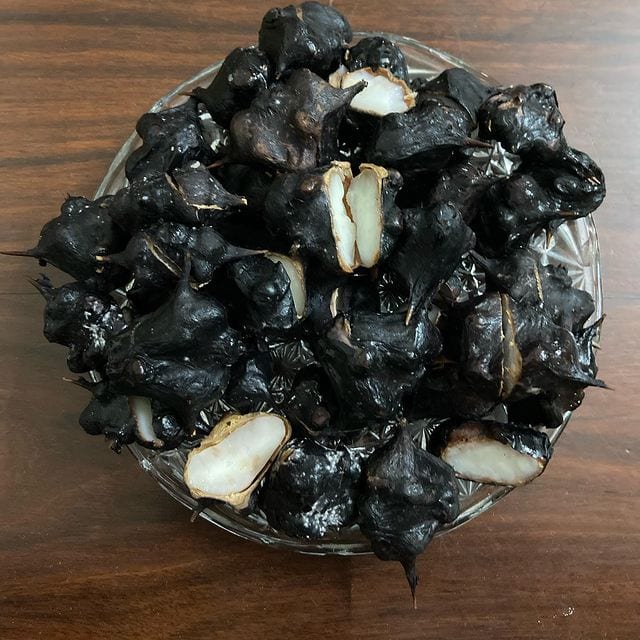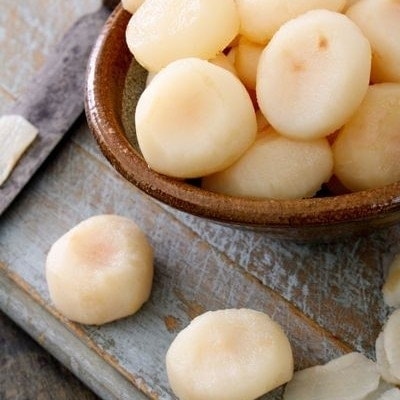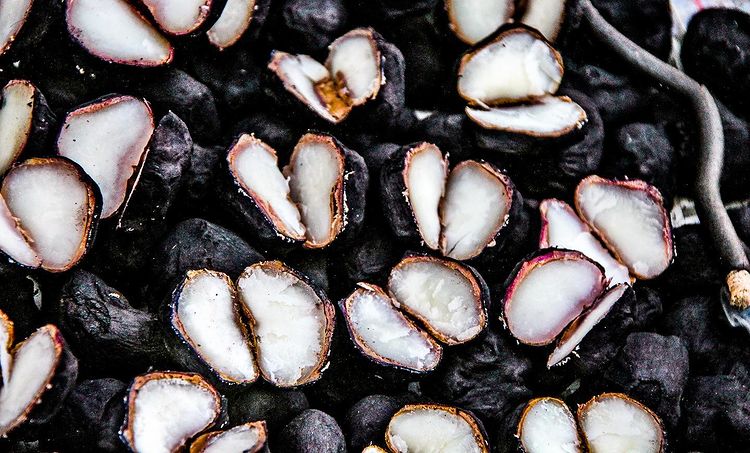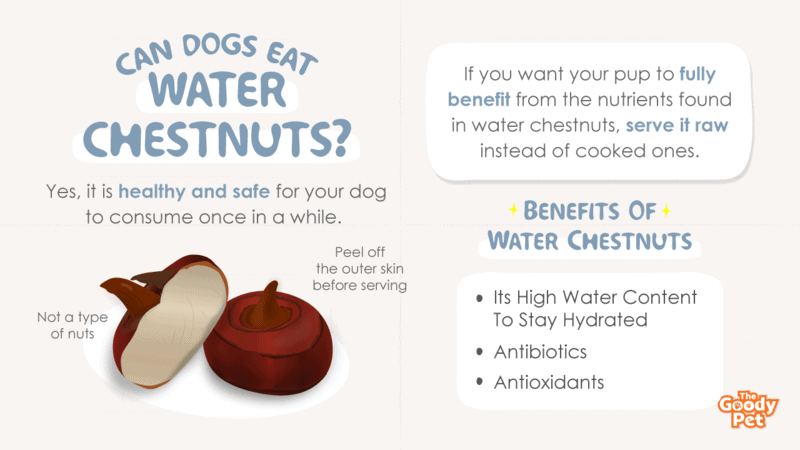You have been researching the list of healthy treats to give your dog for being loyal and obedient. Then suddenly, you came across water chestnuts. You know it’s suitable for human consumption, but you are not sure if it’s suitable for your canine.
Water chestnuts are healthy and safe for your dog to consume once in a while. Your canine will better enjoy them if it’s cooked. The raw outer skin of water chestnuts can be a choking hazard if swallowed by your dog, so always remove them before feeding your pup.
One of the benefits of feeding water chestnuts to your dog is that it is a great way for your dog to stay hydrated. Do you want to know about some other benefits of water chestnuts for your dog? We urge you to keep reading this article to know more.
Now, let’s consider if it’s safe for your dog to eat raw water chestnuts.
Are Water Chestnuts Safe For Dogs?

Yes, water chestnuts are indeed safe for your dog to consume without salt and seasonings on occasion.
One of the reasons dogs are drawn to water chestnuts is their crunchiness. Water chestnuts are only effective when given in moderation to your dog.
Dogs are also quite sensitive to excess salt, do not add salt or any seasonings when preparing this treat for your dog.
Can Water Chestnuts Be Eaten Straight From The Can By My Dog?
No, do not give canned water chestnuts to your dog, because it contains too much sodium. Canned foods contain a lot of sodium which is not healthy for your pup.
Unlike humans, dogs can only consume a limited amount of sodium in a day without being affected. They are always at risk of sodium poisoning.
Instead of feeding canned water chestnuts to your canine, freshwater chestnuts are a better option. Some symptoms of sodium poisoning you can notice include:
- Extreme thirst
- Seizures
- Coma
- Muscle spasms
- High fever
If you observe any of the above symptoms in your dog, put a call across to your veterinarian immediately.
Can My Dog Eat Raw Water Chestnuts?
Raw water chestnuts are completely safe for your canine to consume. Always remember to peel off the outer skin before serving it raw to your dog.
If you want your pup to fully benefit from the nutrients found in water chestnuts, serve it raw instead of cooked ones.
But from what I have seen, dogs somehow prefer eating cooked water chestnuts rather than raw ones. But never should you attempt feeding the outer skin to your dog. The outer skin can choke your dog.
Exercise caution when feeding water chestnuts to your furry friend. Feed it only in moderation to your dog to prevent symptoms such as vomiting and nausea.
Are Water Chestnuts Nuts?
Water chestnuts are not nuts. They are a form of aquatic vegetable often grown underwater in muddy areas.
Water chestnuts are mostly found in Asia countries and tropical Africa. Water chestnuts are packed with potassium, vitamin C, and antioxidants.
Not all dogs are great fans of vegetables. Some dogs don’t like any plant-based food in their diet. If your dog falls under this category, look for an alternative for your canine.
What Happens If My Dog Eats Water Chestnuts?

When your dog eats water chestnuts in moderation, it derives a lot of benefits from it. But if your pup consumes it in large quantities, it will lead to vomiting and nausea.
Although water chestnuts are healthy vegetables for your canine, your dog can become sick for taking too much of it.
If your four-legged furry friend is obese, water chestnuts are ideal due to their low carb content. The high water content of water chestnuts helps your dog stay hydrated.
Water chestnuts should not become a staple food for your dog. For example, I strictly recommend giving water chestnuts to your dog once every two weeks.
What Is The Difference Between Chestnuts And Water Chestnuts?
Chestnuts grow on chestnut trees, while water chestnuts thrive in marshy and wetlands. They are both unrelated, as chestnuts are nuts while water chestnuts are corms.
Tree chestnuts belong to the beech tree family—Fagaceae, which are forest trees and shrubs.
While water chestnuts are underground stem enlargements called corms or tubers, you must dig up to harvest.
Although both share the name—chestnut, they are completely different. One similarity between them is the sweet taste they have.
Can Canned Water Chestnuts Be Eaten Raw?
Canned water chestnuts can be eaten raw by you but not your dog. We do not advise people to give raw, canned water chestnuts to their dogs due to their high sodium content.
A few bites of raw, canned water chestnuts will certainly not kill your dog. But if it’s fed in large quantities, your dog will likely die from sodium ion poisoning.
Do Dogs Like Water Chestnuts?
Yes, they do! Dogs enjoy eating water chestnuts because it’s delicious and crunchy. They love eating it whether cooked or raw.
Your dog will enjoy this treat more if it’s steamed or cooked. Always remember not to add any flavor to it when feeding it to your dog.
Although most dogs enjoy eating water chestnuts, do not make the mistake of giving them to your canine regularly.
Can Water Chestnuts Kill My Dog?
No. Water chestnuts will not directly kill your dog if fed in the right amount. Water chestnuts become harmful to your dog when taken excessively.
Stomach troubles are one of the key symptoms you would notice if your canine took canned water chestnuts in excess amounts.
Water chestnuts contain starch, which is hard for dogs to digest. Too much chestnut consumption may cause gastrointestinal distress.
What Are The Benefits Of Water Chestnuts To Dogs?
Water chestnuts provide a significant amount of vitamin B6, copper, riboflavin, manganese, potassium, and a lot more.
The high amount of fiber found in water chestnuts helps to keep the digestive tract of your dog functioning properly.
In addition, water chestnuts are packed with antioxidants and antibiotic compounds. For your dog to benefit fully from all these nutrients, do not over-boil it before giving it to your dog.
Does Water Chestnut Have Calcium?
Yes. Raw water chestnuts contain about 12 mg of calcium with other potent electrolytes.
The calcium found in water chestnuts helps to build and maintain the strong bones of your dog.
Calcium is also required in the formation of vitamin C, a powerful antioxidant. The water content in water chestnuts keeps your canine hydrated all day.

Can I Feed Water Chestnuts To My Dog Every Day?
No, it is a bad idea to feed water chestnuts to your dog every day. Water chestnuts are starchy, as dogs find them difficult to digest.
Water chestnuts are good for dogs to stay healthy, but too many can cause diarrhea, vomiting, and nausea.
Water chestnuts cannot become a part of your dog’s everyday diet. If your dog is a big-sized breed, 2 to 3 chestnuts are okay once every two weeks. If it is a small-sized breed, one chestnut is enough.
Let’s examine some specific benefits of water chestnuts to your dog:
Cancer Prevention
Water chestnuts contain an antioxidant called ferulic acid. There is some evidence that ferulic acid can help reduce or slow the growth of cancer cells.
The anti-cancer effects of water chestnuts are related to their antioxidant content. Cancer cells depend on free radicals in the dog’s body to spread.
Water chestnuts also contain manganese, a trace mineral that fights off free radicals in dogs. Manganese reduces the risk of heart disease and cancer.
Weight Loss
If your dog is obese, water chestnuts are a good addition to your dog’s diet. Water chestnuts are high-volume food known to curb hunger.
Remember not to make this vegetable an everyday part of your dog’s diet.
Water chestnuts are good for weight loss due to their high water content. Water chestnuts have about 74% water content.
Digestive Health
Water chestnuts are packed with loads of fiber. They are good for the digestive tract of your pup because they help with colonic lubrication and transit.
But if your dog takes in too much water chestnuts, this can result in watery stool for your dog.





